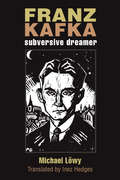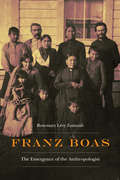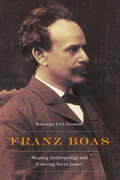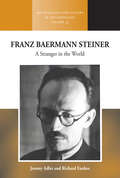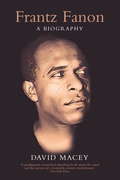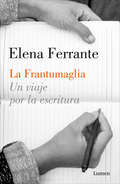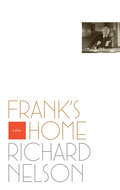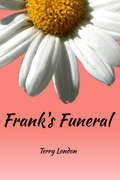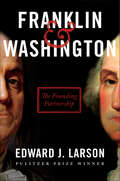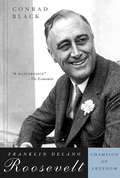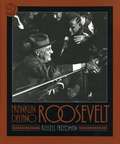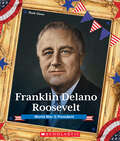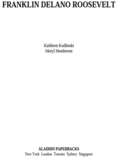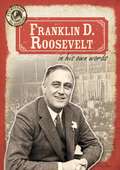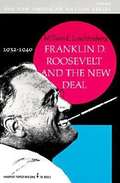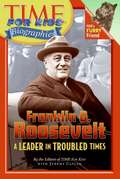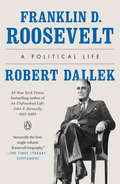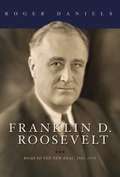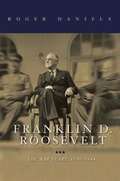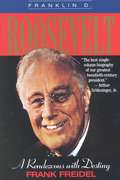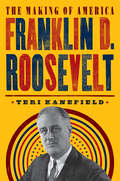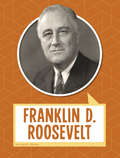- Table View
- List View
Franz Kafka: Subversive Dreamer
by Inez Hedges Michael LowyFranz Kafka: Subversive Dreamer is an attempt to identify and properly contextualize the social critique in Kafka's biography and work that links father-son antagonisms, heterodox Jewish religious thinking, and anti-authoritarian or anarchist protest against the rising power of bureaucratic modernity. The book proceeds chronologically, starting with biographical facts often neglected or denied relating to Kafka's relations with the Anarchist circles in Prague, followed by an analysis of the three great unfinished novels--Amerika, The Trial, The Castle--as well as some of his most important short stories. Fragments, parables, correspondence, and his diaries are also used in order to better understand the major literary works. Löwy's book grapples with the critical and subversive dimension of Kafka's writings, which is often hidden or masked by the fabulistic character of the work. Löwy's reading has already generated controversy because of its distance from the usual canon of literary criticism about the Prague writer, but the book has been well received in its original French edition and has been translated into Spanish, Italian, Portuguese, Greek, and Turkish.
Franz Boas: The Emergence of the Anthropologist (Critical Studies in the History of Anthropology)
by Rosemary Lévy ZumwaltRosemary Lévy Zumwalt tells the remarkable story of Franz Boas, one of the leading scholars and public intellectuals of the late nineteenth and early twentieth centuries. The first book in a two-part biography, Franz Boas begins with the anthropologist’s birth in Minden, Germany, in 1858 and ends with his resignation from the American Museum of Natural History in 1906, while also examining his role in training professional anthropologists from his berth at Columbia University in New York City. Zumwalt follows the stepping-stones that led Boas to his vision of anthropology as a four-field discipline, a journey demonstrating especially his tenacity to succeed, the passions that animated his life, and the toll that the professional struggle took on him. Zumwalt guides the reader through Boas’s childhood and university education, describes his joy at finding the great love of his life, Marie Krackowizer, traces his 1883 trip to Baffin Land, and recounts his efforts to find employment in the United States. A central interest in the book is Boas’s widely influential publications on cultural relativism and issues of race, particularly his book The Mind of Primitive Man (1911), which reshaped anthropology, the social sciences, and public debates about the problem of racism in American society.Franz Boas presents the remarkable life story of an American intellectual giant as told in his own words through his unpublished letters, diaries, and field notes. Zumwalt weaves together the strands of the personal and the professional to reveal Boas’s love for his family and for the discipline of anthropology as he shaped it.
Franz Boas: Shaping Anthropology and Fostering Social Justice (Critical Studies in the History of Anthropology)
by Rosemary Lévy ZumwaltFranz Boas defined the concept of cultural relativism and reoriented the humanities and social sciences away from race science toward an antiracist and anticolonialist understanding of human biology and culture. Franz Boas: Shaping Anthropology and Fostering Social Justice is the second volume in Rosemary Lévy Zumwalt&’s two-part biography of the renowned anthropologist and public intellectual. Zumwalt takes the reader through the most vital period in the development of Americanist anthropology and Boas&’s rise to dominance in the subfields of cultural anthropology, physical anthropology, ethnography, and linguistics. Boas&’s emergence as a prominent public intellectual, particularly his opposition to U.S. entry into World War I, reveals his struggle against the forces of nativism, racial hatred, ethnic chauvinism, scientific racism, and uncritical nationalism. Boas was instrumental in the American cultural renaissance of the 1920s and 1930s, training students and influencing colleagues such as Melville Herskovits, Zora Neale Hurston, Benjamin Botkin, Alan Lomax, Langston Hughes, and others involved in combating racism and the flourishing Harlem Renaissance. He assisted German and European émigré intellectuals fleeing Nazi Germany to relocate in the United States and was instrumental in organizing the denunciation of Nazi racial science and American eugenics. At the end of his career Boas guided a network of former student anthropologists, who spread across the country to university departments, museums, and government agencies, imprinting his social science more broadly in the world of learned knowledge.Franz Boas is a magisterial biography of Franz Boas and his influence in shaping not only anthropology but also the sciences, humanities, social science, visual and performing arts, and America&’s public sphere during a period of great global upheaval and democratic and social struggle.
Franz Baermann Steiner: A Stranger in the World (Methodology & History in Anthropology #42)
by Jeremy Adler Richard FardonFranz Baermann Steiner (1909-52) provided the vital link between the intellectual culture of central Europe and the Oxford Institute of Anthropology in its post-Second World War years. This book demonstrates his quiet influence within anthropology, which has extended from Mary Douglas to David Graeber, and how his remarkable poetry reflected profoundly on the slavery and murder of the Shoah, an event which he escaped from. Steiner’s concerns including inter-disciplinarity, genre, refugees and exile, colonialism and violence, and the sources of European anthropology speak to contemporary concerns more directly now than at any time since his early death.
Frantz Fanon
by David MaceyBorn in Martinique, Frantz Fanon (1925-61) trained as a psychiatrist in Lyon before taking up a post in colonial Algeria. He had already experienced racism as a volunteer in the Free French Army, in which he saw combat at the end of the Second World War. In Algeria, Fanon came into contact with the Front de Libération Nationale, whose ruthless struggle for independence was met with exceptional violence from the French forces. He identified closely with the liberation movement, and his political sympathies eventually forced him out the country, whereupon he became a propagandist and ambassador for the FLN, as well as a seminal anticolonial theorist.David Macey's eloquent life of Fanon provides a comprehensive account of a complex individual's personal, intellectual and political development. It is also a richly detailed depiction of postwar French culture. Fanon is revealed as a flawed and passionate humanist deeply committed to eradicating colonialism.Now updated with new historical material, Frantz Fanon remains the definitive biography of a truly revolutionary thinker.
La frantumaglia: Un viaje por la escritura
by Elena FerranteUn volumen donde se recogen, en forma de cartas o entrevistas, las fuentes del trabajo de Elena Ferrante. «¿Sabes eso de que te ronden la cabeza las notas de una pieza, y luego, cuando te pones a cantarla, la canción es totalmente distinta de la que te obsesionaba? ¿O cuando tienes muy presente la esquina de una calle pero no sabes dónde queda? Para darle un nombre a estos fragmentos uso una palabra que es de mi madre: Frantumaglia. Son cachos y pedazos que vienen de no se sabe dónde y hacen ruido, incluso molestan...» comentaba Ferrante con su editora, Sandra Ozzola en la primavera del 2015. «Frantumaglia» son los pedazos que amueblan el laboratorio de Elena Ferrante desde que empezó a escribir, a principios de los años 90, hasta hoy, cuando la crítica y el público aclaman esta figura como un clásico contemporáneo. Leer este libro es como abrir los cajones de su mesa y fijar la mirada en el cómo y por qué Ferrante escribió primero las tres novelas de Crónicas del desamor y luego la espléndida saga «Dos amigas». El texto se compone de cartas a sus editores, entrevistas y diálogos apasionados con lectores privilegiados, que han llegado hasta el fondo de la escritura de Ferrante y han entendido su «anchura». Aparecen también la infancia, las ciudades queridas por Elena, su almacén de recuerdos..., en suma, todo lo necesario para conformar el retrato de un gran autor.
La frantumaglia: Un viaje por la escritura
by Elena FerranteUn volumen donde se recogen, en forma de cartas o entrevistas, las fuentes del trabajo de Elena Ferrante, la autora que ha fascinado a más de 5.5 millones de lectores en 42 países con su saga «Dos amigas». «¿Sabes eso de que te ronden la cabeza las notas de una pieza, y luego, cuando te pones a cantarla, la canción es totalmente distinta de la que te obsesionaba? ¿O cuando tienes muy presente la esquina de una calle pero no sabes dónde queda? Para darle un nombre a estos fragmentos uso una palabra que es de mi madre: Frantumaglia. Son cachos y pedazos que vienen de no se sabe dónde y hacen ruido, incluso molestan...» comentaba Ferrante con su editora, Sandra Ozzola en la primavera del 2015. «Frantumaglia» son los pedazos que amueblan el laboratorio de Elena Ferrante desde que empezó a escribir, a principios de los años 90, hasta hoy, cuando la crítica y el público aclaman esta figura como un clásico contemporáneo. Leer este libro es como abrir los cajones de su mesa y fijar la mirada en el cómo y por qué Ferrante escribió primero las tres novelas de Crónicas del desamor y luego la espléndida saga «Dos amigas». El texto se compone de cartas a sus editores, entrevistas y diálogos apasionados con lectores privilegiados, que han llegado hasta el fondo de la escritura de Ferrante y han entendido su «anchura». Aparecen también la infancia, las ciudades queridas por Elena, su almacén de recuerdos..., en suma, todo lo necesario para conformar el retrato de un gran autor. Sobre La frantumaglia se ha dicho...«Así, frantumaglia a frantumaglia, es decir, con fragmentos de pensamiento de altura y en un alarde de observación profunda del mundo y de la literatura, se ha construido el enigma Ferrante.[...] En La frantumaglia -Un viaje por la escritura- se recopilan entrevistas, cartas, conversaciones, confesiones, pensamientos, digresiones... Todo sobre Elena Ferrante, sin destapar a Elena Ferrante, [...] una autora que sobrevive a su propio misterio.»Yolanda Guerrero, Zenda Libros.
Frank's Home
by Richard Nelson"A thoroughly invigorating, tightly focused piece of Chekhovian drama, wherein chatter about work and art . . . fail to mask deep vulnerability."-Chicago TribuneA play about Frank Lloyd Wright set in the summer of 1923, when the great architect has recently left Chicago for California, hoping to mend his relationship with his adult children. Richard Nelson brings to life two great architectural demigods, Wright and Louis Sullivan, only to show their all-too-human frailties.Richard Nelson's plays include Rodney's Wife, Goodnight Children Everywhere, Some Americans Abroad, Franny's Way, New England, and James Joyce's The Dead (with Shaun Davey), winner of the Tony Award for Best Book of a Musical.
Frank’s Funeral
by Terry LondonFrank was an abusive and violent alcoholic. Terry was his eldest daughter. Frank's 'mistress' was a dark and foreboding force throughout Terry's life -- while Frank was alive and well after his death. Terry suffered many beatings as a child and as an adult. Frank was very cruel. He had a warped idea of love. Frank's final wishes in his Last Will and Testament were difficult to comprehend. Sadly, Terry had to fight against members of her own family in the Supreme Court. Terry's raw and incredibly honest story is heartbreaking. Her sense of humour doesn't mask the sadness, but makes some of the words easier to read. This is a true story of strength and courage.
Franklin & Washington: The Founding Partnership
by Edward J. Larson"Larson's elegantly written dual biography reveals that the partnership of Franklin and Washington was indispensable to the success of the Revolution." —Gordon S. Wood From the Pulitzer Prize-winning historian comes a masterful, first-of-its-kind dual biography of Benjamin Franklin and George Washington, illuminating their partnership's enduring importance. NATIONAL BESTSELLER • One of Washington Post's "10 Books to Read in February" • One of USA Today’s “Must-Read Books" of Winter 2020 • One of Publishers Weekly's "Top Ten" Spring 2020 Memoirs/BiographiesTheirs was a three-decade-long bond that, more than any other pairing, would forge the United States. Vastly different men, Benjamin Franklin—an abolitionist freethinker from the urban north—and George Washington—a slaveholding general from the agrarian south—were the indispensable authors of American independence and the two key partners in the attempt to craft a more perfect union at the Constitutional Convention, held in Franklin’s Philadelphia and presided over by Washington. And yet their teamwork has been little remarked upon in the centuries since.Illuminating Franklin and Washington’s relationship with striking new detail and energy, Pulitzer Prize–winning historian Edward J. Larson shows that theirs was truly an intimate working friendship that amplified the talents of each for collective advancement of the American project.After long supporting British rule, both Franklin and Washington became key early proponents of independence. Their friendship gained historical significance during the American Revolution, when Franklin led America’s diplomatic mission in Europe (securing money and an alliance with France) and Washington commanded the Continental Army. Victory required both of these efforts to succeed, and success, in turn, required their mutual coordination and cooperation. In the 1780s, the two sought to strengthen the union, leading to the framing and ratification of the Constitution, the founding document that bears their stamp.Franklin and Washington—the two most revered figures in the early republic—staked their lives and fortunes on the American experiment in liberty and were committed to its preservation. Today the United States is the world’s great superpower, and yet we also wrestle with the government Franklin and Washington created more than two centuries ago—the power of the executive branch, the principle of checks and balances, the electoral college—as well as the wounds of their compromise over slavery. Now, as the founding institutions appear under new stress, it is time to understand their origins through the fresh lens of Larson’s Franklin & Washington, a major addition to the literature of the founding era.
Franklin Delano Roosevelt for Kids: His Life and Times with 21 Activities
by Richard PanchykFranklin Delano Roosevelt's enduring legacy upon the history, culture, politics, and economics of the United States is introduced to children in this engaging activity book. Kids will learn how FDR, a member of one of the founding families of the New World, led the nation through the darkest days of the Great Depression and World War II as 32nd U.S. President. This book examines the Roosevelt family--including famous cousin Teddy Roosevelt and First Lady Eleanor Roosevelt--as well as FDR's early political career and subsequent 12 years in office during some of the most fascinating and turbulent times in American history. Interspersed throughout are first-hand accounts from the people who knew FDR and remember him well. Children will also learn how his personal struggles with polio and his physical disability strengthened FDR's compassion and resolve. In addition, kids will explore Roosevelt's entire era through such hands-on activities as staging a fireside chat, designing a WPA-style mural, sending a double encoded message, hosting a swing dance party, and participating in a political debate.
Franklin Delano Roosevelt: Champion of Freedom
by Conrad BlackFranklin Delano Roosevelt stands astride American history like a colossus, having pulled the nation out of the Great Depression and led it to victory in the Second World War. Elected to four terms as president, he transformed an inward-looking country into the greatest superpower the world had ever known. Only Abraham Lincoln did more to save America from destruction. But FDR is such a large figure that historians tend to take him as part of the landscape, focusing on smaller aspects of his achievements or carping about where he ought to have done things differently. Few have tried to assess the totality of FDR's life and career. Conrad Black rises to the challenge. In this magisterial biography, Black makes the case that FDR was the most important person of the twentieth century, transforming his nation and the world through his unparalleled skill as a domestic politician, war leader, strategist, and global visionary--all of which he accomplished despite a physical infirmity that could easily have ended his public life at age thirty-nine. Black also takes on the great critics of FDR, especially those who accuse him of betraying the West at Yalta. Black opens a new chapter in our understanding of this great man, whose example is even more inspiring as a new generation embarks on its own rendezvous with destiny.
Franklin Delano Roosevelt
by Russell Freedman"As in Lincoln: A Photobiography (Clarion, 1987), Freedman has taken a larger-than-life historical figure about whom innumerable volumes have been written and has retold the story of one man's life in the context of his times. The carefully researched, highly readable text and extremely effective coordination of black-and-white photographs chronicle Roosevelt's priviledged youth, his early influences, and his maturation. Drawing on first-hand observations of his family, friends, and enemies, as well as Roosevelt's own diary entries, Freedman formulates a composite picture of a complex, enigmatic individual and a consummate politician. Roosevelt's public career is given further significance because of the cataclysmic events of the Depression and the tumultuous war years during his presidency. As controversial as many of his programs and policies were or have come to be, no one could ever call to question his dedication, his initiative, or the energy he brought to the job. His all too human shortcomings are just as clearly delineated. Even students with little or no background in American history will find this an intriguing and inspirational human portrait." <br>-School Library Journal
Franklin Delano Roosevelt: World War II President (Presidential Biographies)
by Dusk GlennMeet Franklin Delano Roosevelt, our 32nd president-who battled a debilitating disease to lead America through some of its darkest days.Roosevelt took office during the Great Depression and with World War II on the horizon. He led the nation through both crises with a combination of strength and caring. He will always be remembered.This series of engaging, in-depth books introduces readers to the men who have led our country since its very first days. Lively text and colorful illustrations are supplemented by fun facts, a timeline, and even a sampling of the subject's most famous quotes.Presidential Biographies will be the first books kids reach for when writing a report-or if they're simply looking for a fascinating read!
Franklin Delano Roosevelt: Champion of Freedom (Childhood of Famous Americans Series)
by Kathleen V. KudlinskiThis childhood biography of the 32nd president of the United States explores the events that shaped the tenacious character of a young Franklin Delano Roosevelt.
Franklin D. Roosevelt in His Own Words
by John SheaFranklin D. Roosevelt was one of the most powerful and popular US presidents. He was the only one to serve 12 years and was elected four times. As the leader of the nation, he saw the country through an economic depression and World War II. Through primary sources, personal and political writings, and quotations, readers will become familiar with the man behind the famous name, from his early life to his momentous presidency. This book is a unique way to examine US history in the early twentieth century through the biography of one remarkable man.
Franklin D Roosevelt and the New Deal 1932 -1940
by William E. LeuchtenburgWhen the stability of American life was threatened by the Great Depression, the decisive and visionary policy contained in FDR's New Deal offered America a way forward. In this groundbreaking work, William E. Leuchtenburg traces the evolution of what was both the most controversial and effective socioeconomic initiative ever undertaken in the United States -- "and explains how the social fabric of American life was forever altered. It offers illuminating lessons on the challenges of economic transformation -- "for our time and for all time.
Franklin D. Roosevelt: A Leader in Troubled Times
by Jeremy CaplanThis Time for Kids book vividly portrays the life of Franklin D. Roosevelt focusing on how he rescued the nation out of troubled waters.
Franklin D. Roosevelt: A Political Life
by Robert Dallek“In a period defined by division, gridlock and tweet storms, Dallek crafts a pointillist portrait of the four-term president” —Peter M. Gianotti, Newsday“Will rank among the standard biographies of its subject” —Publishers WeeklyA one-volume biography of Roosevelt by the #1 New York Times bestselling biographer of JFK, focusing on his career as an incomparable politician, uniter, and deal maker In an era of such great national divisiveness, there could be no more timely biography of one of our greatest presidents than one that focuses on his unparalleled political ability as a uniter and consensus maker. Robert Dallek’s Franklin D. Roosevelt: A Political Life takes a fresh look at the many compelling questions that have attracted all his biographers: how did a man who came from so privileged a background become the greatest presidential champion of the country’s needy? How did someone who never won recognition for his intellect foster revolutionary changes in the country’s economic and social institutions? How did Roosevelt work such a profound change in the country’s foreign relations? For FDR, politics was a far more interesting and fulfilling pursuit than the management of family fortunes or the indulgence of personal pleasure, and by the time he became president, he had commanded the love and affection of millions of people. While all Roosevelt’s biographers agree that the onset of polio at the age of thirty-nine endowed him with a much greater sense of humanity, Dallek sees the affliction as an insufficient explanation for his transformation into a masterful politician who would win an unprecedented four presidential terms, initiate landmark reforms that changed the American industrial system, and transform an isolationist country into an international superpower. Dallek attributes FDR’s success to two remarkable political insights. First, unlike any other president, he understood that effectiveness in the American political system depended on building a national consensus and commanding stable long-term popular support. Second, he made the presidency the central, most influential institution in modern America’s political system. In addressing the country’s international and domestic problems, Roosevelt recognized the vital importance of remaining closely attentive to the full range of public sentiment around policy-making decisions—perhaps FDR’s most enduring lesson in effective leadership.
Franklin D. Roosevelt: Road to the New Deal, 1882-1939
by Roger DanielsFranklin D. Roosevelt, consensus choice as one of three great presidents, led the American people through the two major crises of modern times. The first volume of an epic two-part biography, Franklin D. Roosevelt: Road to the New Deal, 1882-1939 presents FDR from a privileged Hyde Park childhood through his leadership in the Great Depression to the ominous buildup to global war. Roger Daniels revisits the sources and closely examines Roosevelt's own words and deeds to create a twenty-first century analysis of how Roosevelt forged the modern presidency. Daniels's close analysis yields new insights into the expansion of Roosevelt's economic views; FDR's steady mastery of the complexities of federal administrative practices and possibilities; the ways the press and presidential handlers treated questions surrounding his health; and his genius for channeling the lessons learned from an unprecedented collection of scholars and experts into bold political action. Revelatory and nuanced, Franklin D. Roosevelt: Road to the New Deal, 1882-1939 reappraises the rise of a political titan and his impact on the country he remade.
Franklin D. Roosevelt: The War Years, 1939-1945
by Roger DanielsHaving guided the nation through the worst economic crisis in its history, Franklin Delano Roosevelt by 1939 was turning his attention to a world on the brink of war. The second part of Roger Daniels's biography focuses on FDR's growing mastery in foreign affairs. Relying on FDR's own words to the American people and eyewitness accounts of the man and his accomplishments, Daniels reveals a chief executive orchestrating an immense wartime effort. Roosevelt had effective command of military and diplomatic information and unprecedented power over strategic military and diplomatic affairs. He simultaneously created an arsenal of democracy that armed the Allies while inventing the United Nations intended to ensure a lasting postwar peace. FDR achieved these aims while expanding general prosperity, limiting inflation, and continuing liberal reform despite an increasingly conservative and often hostile Congress. Although fate robbed him of the chance to see the victory he had never doubted, events in 1944 assured him that the victory he had done so much to bring about would not be long delayed. A compelling reconsideration of Roosevelt the president and campaigner, The War Years, 1939-1945 provides new views and vivid insights about a towering figure--and six years that changed the world.
Franklin D. Roosevelt: A Rendezvous with Destiny (Signature Ser.)
by Frank FreidelFreidel (history emeritus, Harvard U., U. of Washington), whose four- volume biography of the young FDR concluded with the launching of the New Deal, now offers a one-volume complete biography. Although he details Roosevelt's life before his presidency, the focus is on the Depression and wartime periods. This will probably become the standard one-volume biography. Annotation(c) 2003 Book News, Inc., Portland, OR (booknews.com)
Franklin D. Roosevelt: Thirty-second President Of The United States
by Miriam GreenblattFollows the life of the thirty-second president from birth to death, examining his childhood, education, employment, and political career.
Franklin D. Roosevelt: The Making Of America #5 (The Making of America)
by Teri KanefieldThis biography for young readers explores the life of the thirty-second president, who lifted the United States from depression to global leadership.When Franklin D. Roosevelt was first elected president in 1933, America was in the throes of the Great Depression—the worst economic crisis in U.S. history—and the world was experiencing a menacing rise in Nazism and other dangerous extremists. Throughout his four presidential terms, Roosevelt was a steady and inspiring leader. He implemented progressive social reform through his New Deal agenda and helped lift America from economic crisis. He guided America to victory in World War II. Born into wealth and privilege, Roosevelt entered politics at a young age. His career and world views were shaped by his marriage to Eleanor Roosevelt and his long struggle with polio. Franklin Delano Roosevelt, our thirty-second president, forever left his mark on our nation and the world. By the time of his death, America had grown to a global economic and military superpower. His New Deal legislation changed the relationship of American citizens to their government. His policies came close to fully realizing Alexander Hamilton’s vision of a government that touches and improves the lives of all citizens.The book includes selections from Roosevelt’s writings, endnotes, a bibliography, and an index.“Kanefield provides readers with an intimate examination of Franklin Delano Roosevelt. . . . It flows in a friendly and welcoming style that reluctant readers will appreciate. . . . A solid account for both history buffs and report-writers.” —Kirkus Reviews“Neither hagiography nor a hatchet job, this evenhanded overview of FDR walks a middle path perfect for middle grade readers. A commendable addition to school and public library collections.” —School Library Journal
Franklin D. Roosevelt (Biographies)
by Laura K. MurrayHow much do you know about Franklin Roosevelt? Find out the facts you need to know about the 32nd president of the United States. You'll learn about the early life, challenges, and major accomplishments of this important American.
